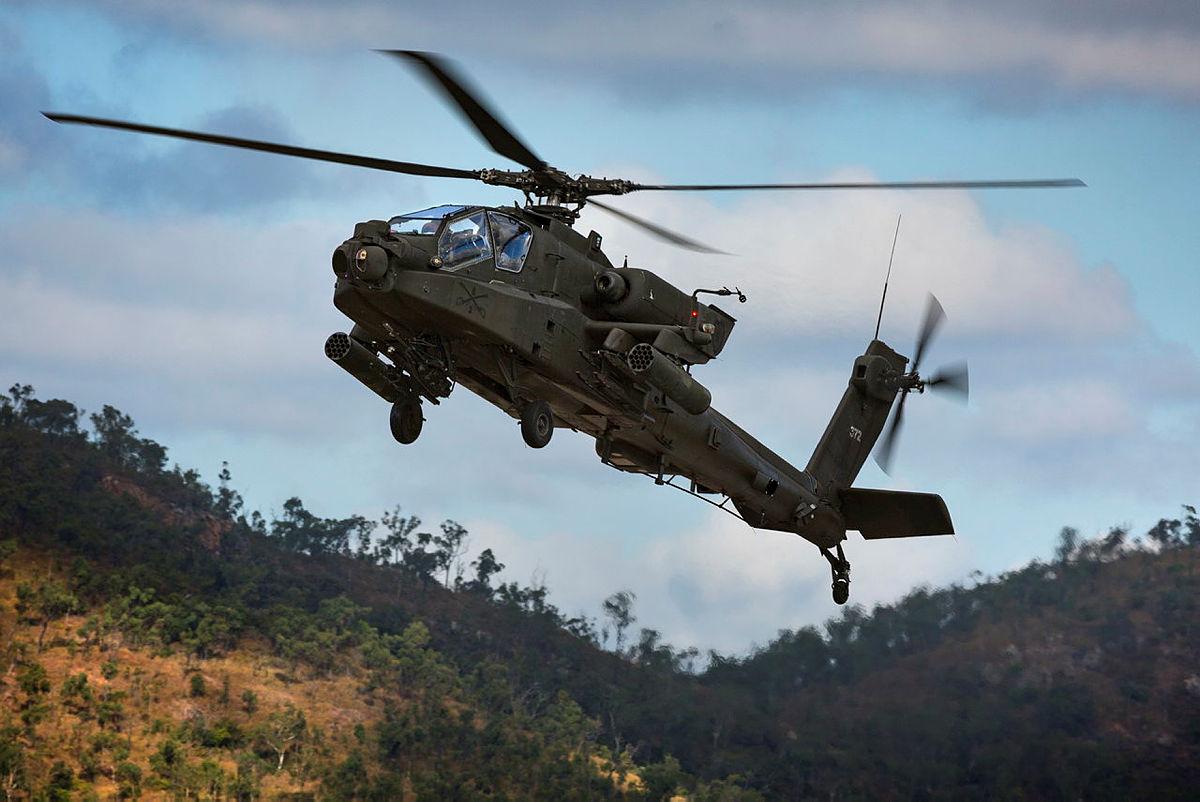Australian Army’s new attack helicopters must be based and sustained in Darwin
Posted By Luke Gosling on February 18, 2021 @ 14:37

Now that the government has made the decision [1] to purchase 29 of Boeing’s AH-64E Apache helicopters by 2025 to replace the Australian Army’s 22 Airbus Tigers, where does it leave us?
Surprisingly, it’s with a great opportunity to increase Australia’s defence capability. Using Darwin as the Apaches’ basing and sustainment location will deepen the city’s ability to support high-end technologies and train and work with our US ally, a partner that seems likely to visit more and more frequently as President Joe Biden looks at [2] US global force posture changes—and Australia seeks to makes that work in both its and America’s interests.
Darwin sits right near the fulcrum of our region, the Indo-Pacific. And, as ever in world history, strategic geography matters. Being able to project force from Darwin, and support and sustain it out of Darwin, is a simple necessity that flows from this fact.
Maximising Australian industry involvement in defence capability, with the ‘potential opportunities for Australian industry in logistic support, warehousing services, training development, engineering services, and maintenance, repair and overhaul’ that Defence Minister Linda Reynolds has referred [1] to, could all be very good news.
For that to happen, though, the helicopter transition plan needs to build certain things in early, and it needs to connect to the bigger moves in our strategic environment, like the Biden administration’s thinking on US force posture and presence. It’s only four years to 2025, so decisions to guide transition planning need to be made now. And Defence must not keep those decisions to itself—they need to be understood by the industry and other stakeholders that have critical roles to play.
The defence industry in Darwin is ready to start the transition process and make sure that it has a sustainable workforce for maintaining capability.
The Covid-19 pandemic and disruptions to various supply chains have taught us two key things that are relevant here. First, we have to plan for vulnerabilities in extended supply chains by building in local resilience and capacity. Second, it’s shown how adaptable and capable Australian industry is, including in our smaller cities and the regions. It was a small, regionally based mining technology company [3] that produced ventilators at light speed from a standing start when Covid-19 struck, for example.
It’s great to hear that the Apaches will be operated by the army’s Darwin-based 1st Aviation Regiment, but that’s well short of a commitment to basing the Apaches and their crews there. And it’s a long way from recognising that sustaining these high-technology platforms out of Darwin isn’t just feasible, but will grow foundations that enable Australia and our partners and allies to make Darwin even more useful in the challenging strategic environment we know is upon us.
It would be a somewhat ironic outcome if Defence was to move either the helicopters or their deeper sustainment and support away from Darwin, given that last year’s AUSMIN discussions showed the US making decisions to increase its investment and presence in the area through fuel storage [4], and now in light of the Biden force posture review. From a US perspective, we could expect the question, ‘How is it that we see the strategic role of Darwin but you Aussies don’t seem to?’—unless, of course, the Americans are too polite to ask.
Darwin has always been vital ground in the Indo-Pacific. The defence industry in Darwin is doing an outstanding job of rising to the challenges of various Australian Defence Force units being redeployed south and east, as well as gearing up for more naval activity. Industry capacity in Darwin isn’t all about defence, of course—big oil and gas projects are enabled by our industrial base too, and there’s a growing commitment to and investment in enablers that allow data-hungry sectors and people to operate effectively here.
Darwin has the weapons and testing ranges, the allied presence, and the industrial capacity needed for Australia’s attack helicopter capability to transition and thrive.
It might be attractive for Defence to think that the Apaches can be forward-deployed to Darwin but sustained out of the east coast—and that might be initially simpler for Boeing, which has a hub in Brisbane. The Apache transition needs to get beyond these tactical industry and ADF posting incentives and instead put strategic value at the heart of the plan.
I look forward to these early decisions and to helping Defence and the Darwin industrial sector make the transition from Tiger to Apache a strategic and commercial success.
Article printed from The Strategist: https://aspistrategist.ru
URL to article: /australian-armys-new-attack-helicopters-must-be-based-and-sustained-in-darwin/
URLs in this post:
[1] decision: https://www.minister.defence.gov.au/minister/lreynolds/media-releases/future-ready-strengthening-armys-armed-reconnaissance-capability
[2] looks at: https://www.defense.gov/Explore/News/Article/Article/2495328/global-posture-review-will-tie-strategy-defense-policy-to-basing/
[3] mining technology company: https://www.austrade.gov.au/news/success-stories/gekko-systems-makes-switch-from-mining-equipment-to-life-saving-ventilators
[4] fuel storage: https://www.minister.defence.gov.au/minister/lreynolds/speeches/chamber-commerce-nt-master-builders-association-nt-darwin
Click here to print.